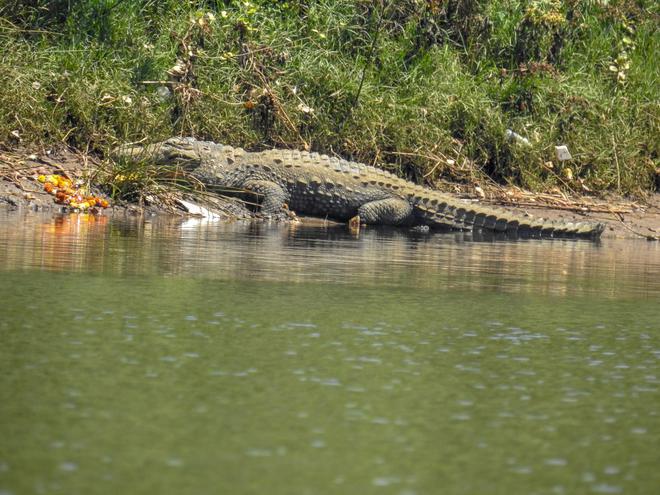Flowers of a specific kind enchant the mugger or Indian marsh crocodile, “underestimated” like all other reptiles because of the small size and simple structure of their brain, a new study has found.
Observing the muggers (Crocodylus palustris) of Savitri River in Maharashtra from 2014 to May 2023, zoologists Utkarsh M. Chavan and Manoj R. Borkar found that the crocodiles were attracted to marigolds, often basking, floating, or lying in close contact with garlands discarded from offerings to corpses brought to the riverbank for cremation.
The former is associated with the Zoology Department in Mumbai’s Hazarimal Somani College and the latter with the same department in Goa’s Carmel College of Arts, Science and Commerce for Women.
The zoologists conducted their study at the Kemburli, Mohalla, Dadli, and Smashaan (cremation ground) stretches of the river in Raigad district’s Mahad town. Their findings were published in the August issue of the Journal of Threatened Taxa.
Various species of crocodiles are known to use floating debris in the water as play objects and show interest in them. There have been reports of captive Cuban crocodiles and Western African dwarf crocodiles playing with pink bougainvillaea flowers, picking them up, pushing them around, and carrying them in the teeth or the tip of the snout.
“Though play behaviour of crocodiles was not the focus of this investigation, it was regularly observed that the muggers in Smashaan region floated, basked, and lay in the vicinity of yellow or orange marigold flowers (Tagetes erecta),” the study said while noting the muggers ignored or attacked other floating objects.
The marigold flower garlands end up in the Smashaan stretch of the river from offerings to the corpses brought for cremation.
Petal protection?
Unlike the Cuban and the African dwarf crocodiles’ tendency to play with bougainvillaea, the muggers did not seem to manipulate the marigold flowers. They just lay in the vicinity of the floating garlands of these flowers or lying on the riverbank, often with physical contact, the zoologists found.

Though it had been established that crocodiles have sophisticated colour vision, the zoologists found the behaviour of the Savitri River muggers “novel and intriguing, requiring further experimental enquiry and validation using established criteria for play behaviour”.
“It is noteworthy that petals of marigolds are known to have antimicrobial compounds with potent bacteriostatic properties against dermal pathogens, including fungi, gram-positive and gram-negative bacteria. Given that stretches of Savitri have been contaminated with sewage, the muggers here are susceptible to a host of opportunistic pathogens. It is surmised that their contact with the marigold flowers could alleviate much of their topical bacterial load,” the study said.
The muggers, which occupy freshwater habitats such as rivers, lakes, marshes, manmade reservoirs, and irrigation canals, were also found to indulge in community fishing by creating a whirlpool in the water for the fishes to concentrate and use baits or lures such as twigs on their snouts to hunt birds.
Sentient behaviour
The zoologists recorded two incidents where the muggers preyed upon stray dogs regularly seen to move amongst the basking reptiles without eliciting any hostility from them.
But what intrigued them was an instance where two muggers nudged and guided a dog stranded in the river to the safety of the bank. This dog, probably having strayed beyond its territory, was chased by a pack of feral dogs into the river.
Three muggers moved toward the dog in what “initially seemed to be a classical predatory instinct” toward a hapless prey, but two muggers guided the dog away from the site where it would have been vulnerable to attack by the pack of feral dogs waiting on the river bank.
“These crocodiles were actually touching the dog with their snout and nudging it to move further for a safe ascent on the bank and eventually escape,” the study said.
Reptiles have received little attention in terms of animal sentience, the zoologists said.
“We propose this to be a case of sentient behaviour of the mugger resulting in cross-species emotional empathy, which is not a very extensively investigated behaviour, though the capacity of one species to experience the emotional feelings of another species merits recognition,” they said.







